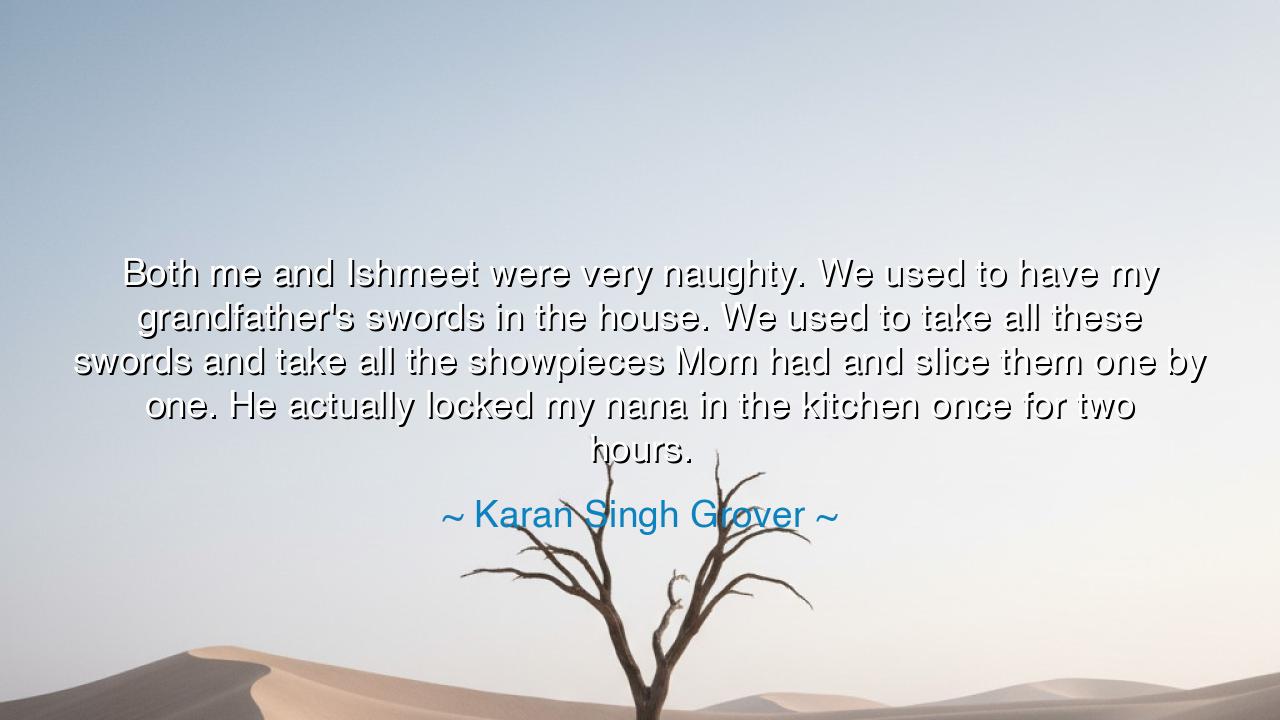
Both me and Ishmeet were very naughty. We used to have my
Both me and Ishmeet were very naughty. We used to have my grandfather's swords in the house. We used to take all these swords and take all the showpieces Mom had and slice them one by one. He actually locked my nana in the kitchen once for two hours.






In the words of Karan Singh Grover, we hear a tale that at first seems lighthearted and mischievous: “Both me and Ishmeet were very naughty. We used to have my grandfather's swords in the house. We used to take all these swords and take all the showpieces Mom had and slice them one by one. He actually locked my nana in the kitchen once for two hours.” Yet beneath this laughter lies a deeper current—a whisper from the river of youth that speaks of innocence, power, and the untamed spirit of the child before the burdens of the world descend upon him.
In those playful moments with swords, the young Karan and Ishmeet were not merely breaking the fragile ornaments of the household. They were testing the boundaries of their world, stretching the invisible cords that bind all who are young and restless. The swords, once belonging to the grandfather, symbolized heritage, strength, and the warrior’s spirit—passed down through generations. To wield them, even in jest, was to inherit something sacred: the fire of curiosity and the courage to act. The slicing of showpieces, though mischievous, was the raw expression of that inner force which, if refined, can forge heroes out of mere boys.
Throughout the ages, many have walked this path of reckless energy before wisdom tempered it. Alexander the Great, when but a youth, tamed the mighty horse Bucephalus—a creature feared by grown men. Where others saw danger, he saw potential. His father, King Philip, declared, “O my son, seek thee a kingdom equal to thyself, for Macedonia is too small for thee.” Thus the boy who once grasped the reins of a wild horse went on to hold the world in his grasp. In this same way, young Karan’s childhood adventure reflects the eternal truth that within mischief often hides the seed of greatness. For every act of unbridled energy carries, within its storm, the calm eye of purpose yet undiscovered.
But the story does not end in destruction. When Karan tells of how Ishmeet locked his nana in the kitchen, we glimpse both the innocence of ignorance and the weight of consequence. For two hours, the elder was trapped—not out of malice, but out of the playful arrogance that only youth can know. And yet, from such folly arises understanding. The child learns that power, if unguarded, may harm; that joy without awareness may wound those we love. It is through these small moments that wisdom plants its roots in the heart.
In the ancient scriptures of India, it is said: “He who knows not, yet knows he knows not, is a child—teach him.” Such was Karan and Ishmeet, children of boundless spirit, not yet aware of the depth of their own actions. Their story is a mirror held up to every soul who once ran wild through the halls of youth, sword in hand or dream in heart, carving shapes in the air of freedom. It reminds us that the wildness of the heart is not to be extinguished, but to be honed—as the sword is sharpened in fire before it shines.
The lesson then is this: do not mourn the wildness of your younger self, nor repress the spark that once made you daring. Instead, temper it with purpose. As fire can forge steel or burn down homes, so too can passion either build or destroy. Those who carry the sword of their spirit must learn to wield it with awareness, compassion, and discipline. Let your energy serve creation, not chaos; let your curiosity birth understanding, not harm.
So, when you remember your own youthful mischief—the laughter, the mistakes, the trembling moments when your courage outpaced your wisdom—do not hide them in shame. Rather, give thanks for them, for they are the swordmarks of your soul. Each scar, each story, is a teacher. From the playful destruction of showpieces to the forging of destiny, every heart must journey from innocence to insight. The path is long, but it is beautiful.
Therefore, dear listener, if you would take one action from this tale, let it be this: hold the sword, but with reverence. Let your strength be softened by love, your curiosity guided by patience. For the child who once broke what was fragile may one day build what is eternal.






AAdministratorAdministrator
Welcome, honored guests. Please leave a comment, we will respond soon